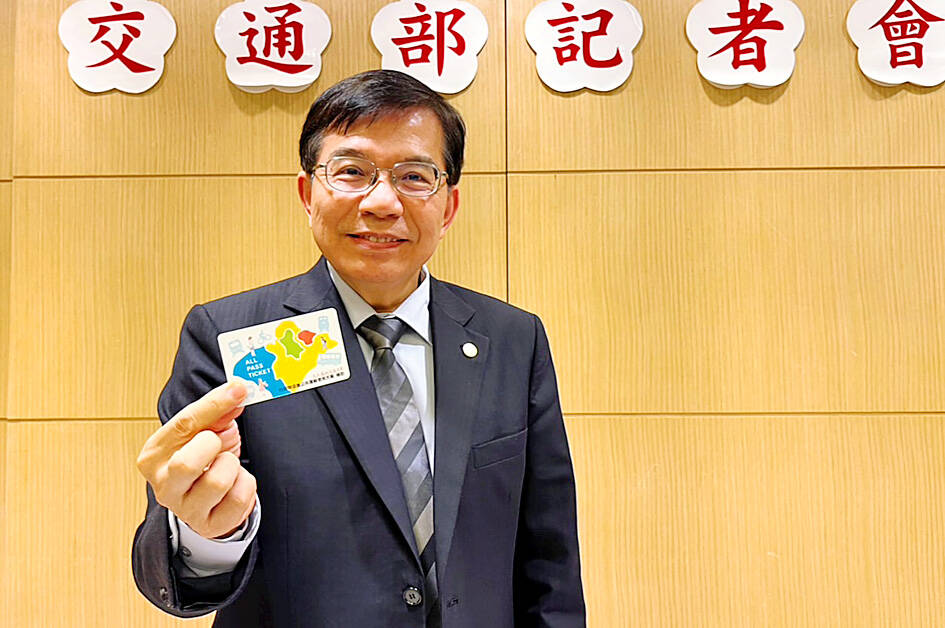A monthly mass transit pass for commuters in Taipei, Taoyuan, Keelung and New Taipei City is to go on sale for NT$1,200 (US$39.47) starting in July after the Executive Yuan yesterday approved a Ministry of Transportation and Communications plan to promote the use of public transportation nationwide.
Meanwhile, Kaohsiung Mayor Chen Chi-mai (陳其邁) announced that the city would offer two types of monthly passes for commuters.
People traveling within Kaohsiung can from April 1 purchase a monthly pass for NT$399, while those commuting between Tainan, Kaohsiung and Pingtung County can from July 1 purchase a monthly pass for NT$999.

Photo: Chen Hsin-yu, Taipei Times
Kaohsiung commuters who help reduce carbon emissions by 6 tonnes per year by using the public transportation system would be rewarded with a free monthly pass, the Kaohsiung City Government said.
The NT$20 billion funding for the nationwide monthly pass program would be sourced from last year’s NT$380 billion surplus tax revenue, the ministry said.
The program has three large commuter circles: Taipei, Taoyuan, Keelung and New Taipei City in the north; Taichung, and Changhua and Nantou counties in the center; and Tainan, Kaohsiung and Pingtung County in the south.
A monthly pass would give commuters unlimited access to public buses, shared bicycles, light rail, mass rapid transit (MRT) or Taiwan Railways Administration (TRA) systems within its respective circle for 30 days.
The central and southern systems would offer separate inner-city and intercity passes, instead of a single pass for a fixed price, the ministry said.
Cities and counties that do not fall inside any of the commuters’ circles can offer a monthly pass at a fixed price, or offer inner-city and intercity monthly passes, it said.
The ministry said it would design monthly pass cards for the commuters’ circles to distinguish them from other electronic tickets, adding that monthly passes would be issued by local governments.
The cost of producing the cards would be paid entirely by the central government, it said.
The program would subsidize 50 percent of the fares for city buses, MRT and public bike systems in the six special municipalities, and 75 percent of the fares in other municipalities, the ministry said.
Ninety percent of the fares for TRA and highway bus services would also be covered by the program, it said.
The program would also pay for adjustment to card-reading systems to accept monthly passes, the ministry said.
The funding is to be allocated over a three-year period: NT$2 billion this year, NT$9 billion next year and NT$9 billion in 2025, the ministry said.
The Executive Yuan also approved a budget for an extra NT$2.1 billion to enhance shuttle bus services to tourist attractions. The budget would be spent over three years: NT$550 million this year, NT$750 million next year and NT$800 million in 2025.
“When soliciting input for the monthly pass program, some local government officials said the public transportation system is lacking in their cities or counties,” Directorate-General of Highways Director-General Chen Wen-ruey (陳文瑞) said.
“We have also allocated NT$24.5 billion to upgrade public transportation services nationwide from 2021 to 2024,” Chen said.

DEFENDING DEMOCRACY: Taiwan shares the same values as those that fought in WWII, and nations must unite to halt the expansion of a new authoritarian bloc, Lai said The government yesterday held a commemoration ceremony for Victory in Europe (V-E) Day, joining the rest of the world for the first time to mark the anniversary of the end of World War II in Europe. Taiwan honoring V-E Day signifies “our growing connections with the international community,” President William Lai (賴清德) said at a reception in Taipei on the 80th anniversary of V-E Day. One of the major lessons of World War II is that “authoritarianism and aggression lead only to slaughter, tragedy and greater inequality,” Lai said. Even more importantly, the war also taught people that “those who cherish peace cannot

STEADFAST FRIEND: The bills encourage increased Taiwan-US engagement and address China’s distortion of UN Resolution 2758 to isolate Taiwan internationally The Presidential Office yesterday thanked the US House of Representatives for unanimously passing two Taiwan-related bills highlighting its solid support for Taiwan’s democracy and global participation, and for deepening bilateral relations. One of the bills, the Taiwan Assurance Implementation Act, requires the US Department of State to periodically review its guidelines for engagement with Taiwan, and report to the US Congress on the guidelines and plans to lift self-imposed limitations on US-Taiwan engagement. The other bill is the Taiwan International Solidarity Act, which clarifies that UN Resolution 2758 does not address the issue of the representation of Taiwan or its people in

Taiwanese Olympic badminton men’s doubles gold medalist Wang Chi-lin (王齊麟) and his new partner, Chiu Hsiang-chieh (邱相榤), clinched the men’s doubles title at the Yonex Taipei Open yesterday, becoming the second Taiwanese team to win a title in the tournament. Ranked 19th in the world, the Taiwanese duo defeated Kang Min-hyuk and Ki Dong-ju of South Korea 21-18, 21-15 in a pulsating 43-minute final to clinch their first doubles title after teaming up last year. Wang, the men’s doubles gold medalist at the 2020 and 2024 Olympics, partnered with Chiu in August last year after the retirement of his teammate Lee Yang

The Philippines yesterday criticized a “high-risk” maneuver by a Chinese vessel near the disputed Scarborough Shoal (Huangyan Island, 黃岩島) in a rare incident involving warships from the two navies. The Scarborough Shoal — a triangular chain of reefs and rocks in the contested South China Sea — has been a flash point between the countries since China seized it from the Philippines in 2012. Taiwan also claims the shoal. Monday’s encounter took place approximately 11.8 nautical miles (22km) southeast” of the Scarborough Shoal, the Philippine military said, during ongoing US-Philippine military exercises that Beijing has criticized as destabilizing. “The Chinese frigate BN 554 was